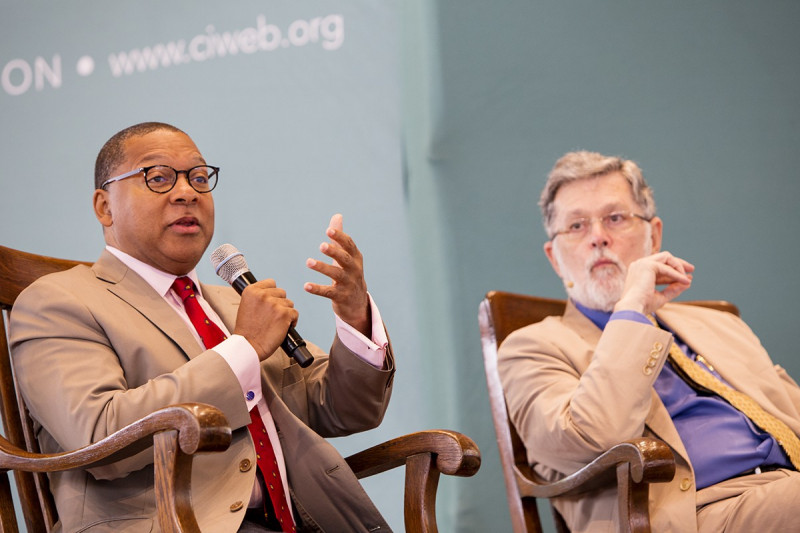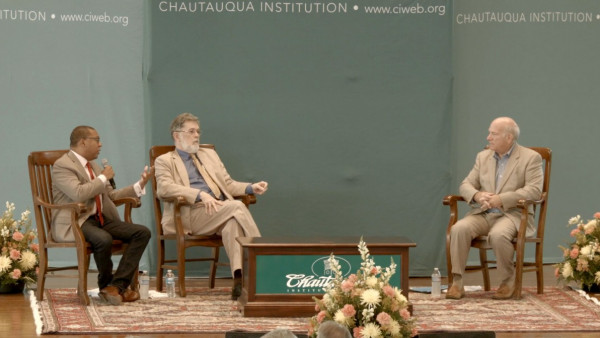Marsalis and Ward Join Becker for Final Morning Lecture

Wynton Marsalis and Geoffrey C. Ward
Longtime friends Geoffrey C. Ward and Wynton Marsalis joined in conversation reflecting on the events of the week and discussing the significance of jazz to American culture and the work they’ve done.
President Tom Becker acted as moderator during the 10:45 a.m. Friday morning lecture in the Amphitheater. The lecture closed the season and this week’s theme “America’s Music with Wynton Marsalis and Jazz at Lincoln Center.”
Becker said the final week summed up the season’s theme “What Does It Means To Be Human?,” because music is an integral part of who people are at their core. The lecture also served as Becker’s final time moderating a conversation on the platform. The audience stood and applauded Becker for his service.
To begin the conversation, Becker asked Marsalis if he considered showing his presentation “The Ballad of American Arts,” which he gave during the Monday morning lecture, to school boards of education.
“It’s something we work on all the time at Jazz at Lincoln Center,” said Marsalis, managing and artistic director of JALC. “Each school board is autonomous. You can’t just have a dictum.”
Marsalis said being involved with education continues to be a primary goal for him. He added that Ward, writer of Ken Burns’ documentary “Jazz” and its companion book, has been able to reach many schools through his work with documentaries. Students have access to the materials, but getting them engaged is the biggest challenge for Marsalis and Ward.
“One of the joys of my life has been, just in the last couple of years, meeting young musicians,” Ward said. “When you do this stuff you think, ‘Great. I did that, and now I’ll move on to something else.’ There are a lot of young musicians who got introduced to jazz by watching that [documentary], and there are people who heard … themselves in that music and wanted to be a part of that music.”
Becker commented on the elegant way Cécile McLorin Salvant spoke during the Wednesday morning lecture as she discussed difficult topics many Americans don’t know how to talk about today. Becker said he was impressed by the way the young 26-year-old jazz singer, who had never given a lecture before, could speak so clearly through her vocals and speech as she talked about race, economics and gender.
McLorin Salvant knows at least three languages and studied law. Marsalis said she’s a bright, young individual with integrity, something he said is not very common in many people regardless of their generation. Musicians like McLorin Salvant and Marsalis speak about controversial topics such as race and gender often, and Marsalis said it’s part of the legacy of their music.
“When she began to sing, it was so absolutely clear, and when Aaron [Diehl] is playing it’s the fruits of all the people who have been teaching,” he said.
A generational gap sometimes prevents young people from talking in a direct way, Ward said. McLorin Salvant, however, isn’t like that. When she heard Ward had polio at age 9, she was curious about the disease and asked Ward about his illness in a direct way.
“She wanted to know all about it. She looked me right in the eye — nobody does that,” Ward said. “She looked me right in the eye, and she said, ‘What was that like? How were people treated? How do you get along?’ And it was not somebody being, you know, curious about freakish things. It was a human being talk to another human being. She has that quality, and you could see that when she was talking here.”
When it comes to natural gifts, Marsalis believes they must be accompanied by a combination of coordination, insight, courage, ability and spirituality.
Marsalis said he thinks of jazz saxophonist and composer John Coltrane when thinking about natural ability and the combination of things that must come together to make a musician. When Coltrane was in the Navy, Marsalis said he did not perform as beautifully as he did later in his career. However, with the extra work needed from these other traits, Coltrane was able to become a professional jazz musician.
During Ward’s Tuesday lecture, he touched on how jazz writers and critics only considered jazz musicians who were innovative to be geniuses. There’s a myth that in order to be a good, well-known jazz musician, an individual must be a genius. However, Ward disagrees with this concept.
He compared the thought to a writer studying English. His professor would not tell the young writer he is a failure if he didn’t come up with an idea or a piece of work that is significantly different from anything ever written. The same philosophy should be applied to jazz musicians.
“What seems to me, too much [in] jazz education — everybody is told you have to take the music somewhere,” Ward said. “You’re really a failure if you’re not a genius. You’re just a musician. That seems completely insane to me.”
Marsalis continued this thought through the lens of how black individuals are compared to geniuses in their fields. He shared a story about when he and a friend were robbed in Lyon, France by two Algerian men.
The larger of the two men had a knife out when he realized Marsalis and his friend were black Americans. Marsalis said the man said, “black Americans … Michael.”
At first, Marsalis didn’t understand what this man meant, but later he thought of the different black Americans with the name Michael who were “geniuses” in their career field — Michael Tyson, Michael Jackson, Michael Jordan.
Marsalis said it’s a belief that in order to be recognizable, one has to be super or genius-level.
“What about just being good?” he asked. “There’s nothing wrong with being good at something, and, I think, if we all had that standard — is every basketball player that’s not Michael Jordan unsuccessful?”
Jazz does not require everyone to be a genius, Marsalis said. The most important part of jazz is being able to express ideas and thoughts through music and to invent things with other people.
“The thing about jazz, for me, is that we don’t need, actually, a genius … because our music is much more collective,” Marsalis said. “We need a group of people who want to play with one another. Our music is made so that you don’t have to be Beethoven or Bach.”
Becker asked about the challenges of being a performer. Ward responded that, though he is not a performer, he knows it takes a lot of guts to get in front of a large crowd and express ideas and thoughts. When a musician enters the spotlight, they have to continue their work even if people don’t like some of the things the musician said or did.
Marsalis related to that statement. He said he had his first interview at 14 years old, and the day after when the article came out, everyone had an opinion about him and what he said.
Over the years, Marsalis has been known for saying what he believes — something he’s done since he first began being interviewed for articles. When he was 19 years old, Marsalis said he spoke like he was talking in his living room, complete with curse words, during an interview for JazzTimes.
When the article was released, Marsalis received a call from his seventh-grade teacher who also happens to be a nun.
“Sometimes things can only be said in one way,” the nun told Marsalis.
Later, Marsalis attended a music festival, and saw Dizzy Gillespie with the article in his music case. Though Gillespie said there was a lot of truth in the article, he wanted Marsalis to be “ready for the return. It might not stop.”
Twenty-five years later, Marsalis understood what Gillespie meant: There is a price a musician pays for saying something that might sound obvious to them but could be considered controversial.
During the conversation, Marsalis and Ward also spoke about race and the legacy left behind by enslaved African-Americans.
“People who have agency all over the world deny that agency to other people,” Marsalis said. “They deny the agency to other people, [and] if they have a Christian mandate and they do it, they feel guilt about it. If they don’t, they don’t feel guilt about it.”
Marsalis said something economic will have to change to address the racial issues America faces today. He spoke about affirmative action and how it was designed to benefit the descendants of slaves, but instead has been applied to “whoever’s skin was brown.”
Many people who benefit from this affirmative action are not a part of that legacy, according to Marsalis.
“I always try to give people a sense of what race is and to understand from an Afro-American viewpoint — not from the standpoint of an African who happened to immigrate to America or a person who does not have that legacy or who does not have family systems that have been a shadow of seven or eight generations of [that legacy],” Marsalis said.
Ward said the world is currently divided, and some people who believe in the Constitution do not believe it should be changed. He said the country can work and be a success if its citizens pay attention to current events and the reasons driving them.
A member of the audience asked about Marsalis’ view on hip-hop and rap music. Marsalis responded that “dislike” is too weak of a word for his view of the genre.
“It’s very difficult for a person, a black person who loved black people, to set themselves apart from a thing that their group of people have decided that, for some imbecilic reason, they’re going to embrace,” Marsalis said.
Marsalis said he has always found the genre abrasive; when he listens to music, he wants to hear typical sounds such as harmonic progressions and melodies and drums. In today’s rap music, many of the sounds are electric.
“I cannot support it on any level,” Marsalis said. “I can’t do it, and I’m never going to do it.”
When his son was 16 years old, he told him to make a book, which Marsalis called the Book of American Literature, that contained 16 of his favorite rap songs. It wasn’t the lyrics that bothered Marsalis as much as it was the music.
“The music is sadder than the literature,” Marsalis said. “The drum is the Afro-American instrument. When that instrument becomes a machine, what does that tell you? That’s telling you something.”
He asked the question: What does it mean when tango no longer has drums? What does it mean when the nation has an appetite for music with electronic music instead of live instruments?
“We are lost,” Marsalis said. “That’s what it’s telling you, and that’s what I think about it.”
Prior to the Q-and-A, Marsalis and Ward concluded their conversation with Becker by discussing the role of institutions and how Jazz at Lincoln Center works as an institution to promote jazz education.
Ward said Chautauqua Institution inspires him because a community of people gather to talk about real issues and look deeper into these issues. He said JALC has the same goals in mind as the Institution, with education being a major pillar for both of them. He expressed hope that issues of race and equality can be resolved through institutions and organizations such as JALC and Chautauqua.
“The world gets better in small ways, but it can get better,” he said. “What I wish is both of these institutions could be duplicated magically again and again.”
By Samantha Ickes
Source: The Chautauquan Daily


Comments
Mankind is Blessed with the Beautiful Music and the people that make it live. Baruch HaShem!
George Fredlund on Aug 28th, 2016 at 9:43pm